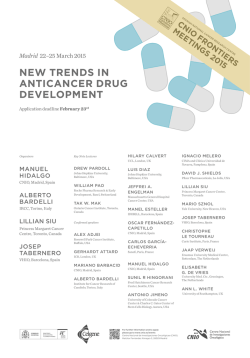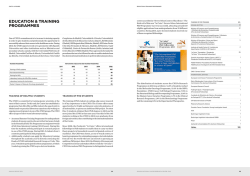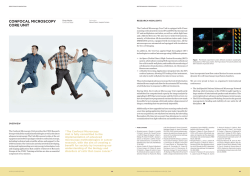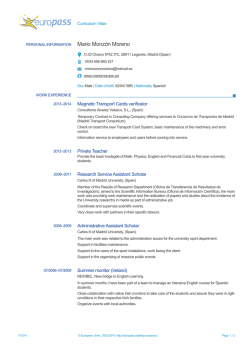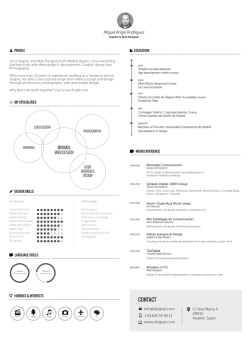
Training Programmes - Centro Nacional de Investigaciones
Facts & Figures Education & Training Programmes EDUCATION & TRAINING PROGRAMMES FUNDING OF PHD TRAINING SPANISH ENTITIES Ministry of Economy and Competitiveness / Ministerio de Economía y Competitividad ( I+D Projects ) the Fundación Banco Santander, Universidad de Barcelona, Universidad Europea de Madrid, Universidad de Zaragoza, Universidad Complutense de Madrid, Universidad de Valladolid, Universidad Pompeu Fabra, and the Fundación Estudios Médicos de Molina del Segura. One of the principal goals of the CNIO is to increase its training capacity in order to give students and professionals the opportunity to advance their careers in the healthcare sector. During 2014, the CNIO has signed several new agreements with Spanish Universities and other institutions, namely with TRAINING PROGRAMMES PARTICIPANTS IN EDUCATION AND TRAINING PROGRAMMES NO. 84 6 Ministry of Economy and Competitiveness / Ministerio de Economía y Competitividad ( Predoctoral fellowships ) 24 Ministry of Education, Culture and Sport / Ministerio de Educación, Cultura y Deporte ( Predoctoral fellowships ) 10 Institute of Health Carlos III / Instituto de Salud Carlos III ( ISCIII ) ( I+D Projects ) 2 Institute of Health Carlos III / Instituto de Salud Carlos III ( ISCIII ) ( Predoctoral fellowships ) 2 Spanish Association Against Cancer ( AECC ) / Fundación Científica de la AECC ( I+D Projects ) 1 Cellectis Agreement 1 Centre for Industrial Technological Development / Centro para el Desarrollo Tecnológico Industrial ( I+D Projects ) 1 1 2010 2011 2012 2013 2014 Training of PhD students 132 123 121 116 108 Post-doctoral training 95 83 81 67 55 Training for MDs 25 20 16 21 14 Laboratory training for MSc/BSc students 54 46 42 36 73 Laboratory training for technicians 29 26 26 19 21 CIBERER Master’s Degree in Molecular Oncology 26 37 37 37 34 ” la Caixa ” Foundation / Fundación ” la Caixa ” ( Predoctoral fellowships ) 34 Botín Foundation / Fundación Botín 1 Hospital de Madrid 1 INTERNATIONAL ENTITIES TRAINING OF BSC/MSC STUDENTS TRAINING OF PHD STUDENTS The CNIO is committed to training junior scientists at the onset of their careers. To this end, the Centre has established a programme that offers BSc and MSc students the opportunity to obtain hands-on practical laboratory experience by working on ongoing research projects in one of the CNIO groups. The CNIO offers 2 types of short-term laboratory training : The training of PhD students in cutting-edge cancer research is of key importance to the CNIO. The Centre offers many opportunities for bright and dynamic university graduates, of all nationalities, to pursue an ambitious PhD project. To attest this, 21 students obtained their PhD degrees in 2014 and 21 more joined the CNIO in that same year. More than one third of the 108 students working at the CNIO in 2014 were graduates from foreign universities, thus contributing to the internationalisation of the Centre. ɗɗ An annual Summer Training Programme for undergraduate students, from any country, who are in their last 2 years of study in the biomedical field. The Programme encompasses 8 weeks of full-time laboratory training ( 312 hours ). During this time the students actively participate in research projects in one of the CNIO groups. During 2014, 8 students from 6 countries participated in this programme. ɗɗ Additionally, students can apply for laboratory training throughout the academic year by directly contacting the Heads of CNIO individual Research Groups or Units. This year, 73 students participated in these programmes, of which 3 ended up joining the CNIO as pre-doctoral students. SCIENTIFIC REPORT 2014 Since 2008, the Fundación “ la Caixa ” offers international fellowships to PhD students to enable them to carry out their thesis projects in biomedical research in Spanish centres of excellence. The CNIO was chosen, as one of 4 such centres, to launch a programme for outstanding young pre-doctoral students from all over the world who have an interest in pursuing an ambitious PhD project. Since 2013, the Ministry of Economy and Competitiveness has undertaken efforts to link the “ la Caixa ”/ CNIO International PhD Programme to distinguished research centres accredited as “ Severo Ochoa Centres of Excellence ”. The second call of this new “la Caixa”-Severo Ochoa International PhD Programme was very successful, attracting around 100 eligible applications from undergraduates from 24 different countries. During 2014, 4 pre-doctoral students received one of these recognised fellowships. 206 The distribution of students across the CNIO’s Research Programmes in 2014 was as follows : 42.6% of students worked in the Molecular Oncology Programme, 13.0% in the BBVA Foundation- CNIO Cancer Cell Biology Programme, 13.9% in the Structural Biology and Biocomputing Programme, 15.7% in the Human Cancer Genetics Programme, 8.3% in the Clinical Research Programme, 0.9% in the Biotechnology Programme and the remaining 5.6% in the Stems Cells and Cancer Group. European Commission Framework Programme 5 Marie Skłodowska-Curie actions of the European Commission 1 European Research Council 8 European Urology Association ( Predoctoral fellowship ) 1 Melanoma Research Alliance 1 Pfizer 2 Fulbright Spain / Fulbright España ( Predoctoral fellowships ) 3 Prostate Cancer Foundation Young Investigator Award 1 Bayer 1 Hoffmann-La Roche 1 TOTAL SPANISH NATIONAL CANCER RESEARCH CENTRE, CNIO 24 108 207 FACTS & FIGURES EDUCATION & TRAINING PROGRAMMES POST-DOCTORAL TRAINING POSTGRADUATE PROGRAMMES One of the CNIO’s prime objectives is to attract young researchers, who have recently obtained their PhD or MD degrees, and to offer them highly attractive research projects at the forefront of cancer research. In 2014, 55 postdoctoral fellows worked at the CNIO. Notably, more than 45% of these fellows were from outside of Spain, many coming from very prestigious international institutions. In 2014, the Fundación Banco Santander signed a new agreement with the CNIO to continue the highly competitive fellowship programme aimed to support outstanding young scientists who have been trained in the UK or in the USA, and who wish to start or continue their postdoctoral training at the CNIO. One young scientist, who came from the University of Arizona, was awarded a Santander Foundation-CNIO Fellowship in 2014. FUNDING SOURCES OF POST-DOCTORAL CONTRACTS SPANISH ENTITIES 31 Ministry of Economy and Competitiveness / Ministerio de Economía y Competitividad ( I+D Projects ) 3 Ministry of Economy and Competitiveness / Ministerio de Economía y Competitividad ( Posdoctoral Fellowships ) 3 Institute of Health Carlos III / Instituto de Salud Carlos III ( ISCIII ) ( I+D Projects ) 1 Institute of Health Carlos III / Instituto de Salud Carlos III ( ISCIII ) ( Posdoctoral Fellowships ) 7 Community of Madrid / Comunidad Autónoma de Madrid ( I+D Projects ) 2 Spanish Association Against Cancer ( AECC ) / Fundación Científica de la AECC ( Posdoctoral Fellowships ) 6 Botín Foundation / Fundación Botín 1 CIBERER 2 Madrid-MIT M+Visión ( Posdoctoral Fellowship ) 1 Cris Foundation / Fundación Cris 1 CNIO 4 INTERNATIONAL ENTITIES 24 European Commission Framework Programme 8 European Research Council 6 Association for International Cancer Research 3 Daiichi Sankyo Agreement 1 European Association for the Study of Diabetes 2 Hoffmann-La Roche 1 Clinical trials Boehringer 1 Federation of European Biochemical Societies ( Posdoctoral Fellowship ) 1 Leukemia and Lymphoma Society ( Posdoctoral Fellowship ) 1 TOTAL SCIENTIFIC REPORT 2014 NO. 55 208 In addition, the CNIO – in collaboration with academic institutions in Spain – provides access to a variety of postgraduate programmes that cover the areas of Cellular & Molecular Biology, Molecular Biomedicine, Biotechnology, Biocomputing & Computational Biology, Clinical & Applied Cancer Research, Therapeutic Targets, and Molecular Oncology. Official Postgraduate Programmes in Biosciences The majority of the international postgraduate trainings offered at the CNIO are developed in collaboration with the Faculty of Medicine and Faculty of Sciences at the Autonomous University of Madrid ( UAM ) through 4 Official Postgraduate Programmes, namely the Doctorate in Biosciences, Masters in Molecular and Cell Biology, Masters in Molecular Biomedicine, and Masters in Biotechnology. Master’s Degree in Biocomputing and Computational Biology The Master in Bioinformática y Biología Computacional – directed by Alfonso Valencia, Director of CNIO’s Structural Biology and Biocomputing Programme – is organised together with the National School of Health of the National Institute of Health Carlos III ( Escuela Nacional de Sanidad del Instituto de Salud Carlos III, ENS-ISCiii ), and the Madrid Science Park ( Parque Científico de Madrid, PCM ). Official Master’s Degree in Clinical and Applied Cancer Research Manuel Hidalgo, CNIO’s Vice-Director of Translational Research codirects – in collaboration with the CEU-San Pablo University in Madrid ( USP-CEU ) – a Postgraduate Training Programme in Clinical and Applied Cancer Research : the Máster Universitario en Investigación Clínica y Aplicada en Oncología. SPANISH NATIONAL CANCER RESEARCH CENTRE, CNIO 209 Facts & Figures Education & Training Programmes Official Master’s Degree in Therapeutic Targets, Research and Development LABORATORY TRAINING FOR TECHNICIANS This training programme has been developed for students in Anatomical Pathology and is organised through agreements with 10 institutions that provide secondary education for laboratory technicians in Spain. It provides students with handson knowledge in cellular and molecular biology techniques. The programme consists of 20 weeks ( 710 hours ) of laboratory training for students. Additionally, the CNIO offered real-life work The CNIO collaborates with the Biochemistry and Molecular Biology Department at the University of Alcala ( UAH ) for the Máster Oficial en Dianas Terapéuticas, Investigación y Desarrollo. Master’s Degree in Molecular Oncology The main objective of this Master’s degree, organised in collaboration with the Centre for Biomedical Studies ( Centro de Estudios Biosanitarios, CEB ), is to offer training in molecular oncology with emphasis on the latest findings in translational research that are essential for state-of-the art oncological clinical practice. Upon successful completion of the 500 hours of training, a certificate for a Master’s degree in Molecular Oncology – recognised by the European School of Oncology ( ESO ) – is awarded. experience to 1 student of Analytical Assays and Quality Control for 13 weeks ( 370 hours ); 1 student of Clinical Diagnosis for 13 weeks ( 380 hours ); 1 student of Diagnosis Imaging for 8 weeks ( 224 hours ); and 2 students of Medical Archiving and Recording for 14 weeks ( 440 hours ). Of the 21 students who participated in this programme in 2014, 4 were hired by the CNIO. TRAINING FOR MDS In line with CNIO’s commitment to bridge the “ bench to bedside ” gap, the Centre offers excellent training opportunities in molecular diagnostics and familial cancer genetics to MDs and other health care professionals and also counts with an OncoMIR Rotation Programme ; this initiative is a collaborative effort with the Spanish Ministry of Health ( now Ministerio de Sanidad, Servicios Sociales e Igualdad ). Training usually consists of a 3-month period during residency. In 2014, 14 medical residents from 12 different hospitals enjoyed the benefits of rotations within the different Groups and Units of the CNIO. ADVANCED TRAINING OF SCIENTISTS THROUGH EXTRAMURAL PROGRAMMES During 2014, 11 scientists were supported by the Ramón y Cajal Programme. This special initiative, established in 2001 by the former Spanish Ministry of Science and Technology ( now Spanish Ministry of Economy and Competitiveness ) aims to encourage Spanish or foreign scientists working abroad to return to or relocate to Spain. Successful candidates are selected on the basis of their potential capacity to lead independent projects and groups, or to contribute successfully to the ongoing research in the existing groups. Twenty other scientists were funded by similar programmes, including the Miguel Servet ( 3 contracts ), Sara Borrell ( 4 contracts ) and Río Hortega ( 3 contracts ) programmes, Juan de la Cierva programme ( Spanish Ministry of Economy and Competitiveness, 2 contracts ) and the Spanish Association Against Cancer ( AECC, 8 contracts ). VISITING RESEARCHER PROGRAMME The Jesús Serra Foundation, part of the Catalana Occidente Group, aims to help eminent international specialists work together with CNIO researchers for a few months in order to expand their knowledge in areas of common interest. During 2014, Eva Nogales from the University of California in Berkeley ( USA ), Andre Nussenzweig from the National Cancer Institute in Bethesda ( USA ) and Peter Petzelbauer from the Medical University of Vienna ( Austria ) were beneficiaries of the Jesús Serra Foundation’s Visiting Researcher Programme. SCIENTIFIC REPORT 2014 210 SPANISH NATIONAL CANCER RESEARCH CENTRE, CNIO 211
© Copyright 2026
